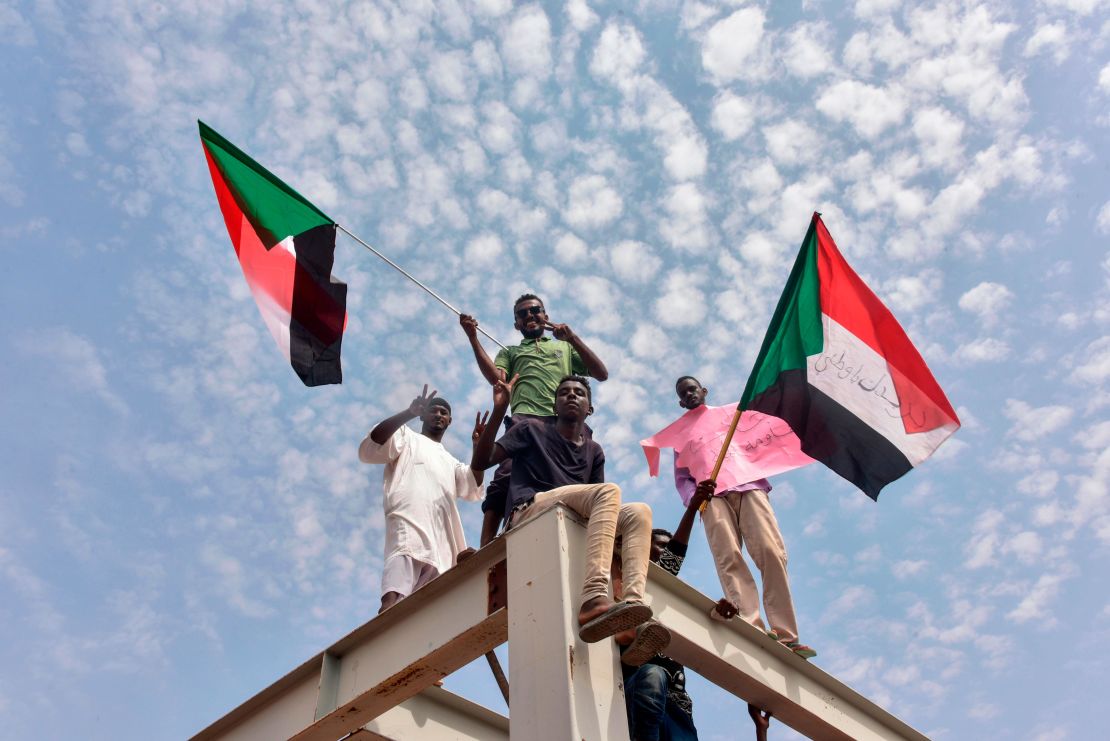After almost nine months of violence and wrangling, Sudan came a step closer to a civilian government on Saturday when opposition leaders and military generals signed a power-sharing agreement in the capital, Khartoum.
The choice of a fearsome commanderon the signing table, and the absence of women who played a crucial role in the protest movement, show that obstacles still remain in Sudan’s path to full democracy.
The agreement follows protests that toppled 75-year-old dictator Omar al-Bashir, ending his 30-year rule over the northeastern African country.
Under Bashir’s iron grip, an entire generation grew up in the shadow of war, where the threat of torture in infamous “ghost houses” was never far away, and press freedom nonexistent.
Following his ouster, the Transitional Military Council (TMC) moved in, announcing a three year transitional period.
But protesters continued their call for civilian rule, and on Saturday thousands of people flooded to the capital to celebrate the historic signing.

The choice of signatories in the power-sharing agreement was heavy with symbolism.
The opposition – the Sudanese Professional (SPA) – put forward Ahmed Al-Rabee, a schoolteacher earning the equivalent of around $33 a month and emblematic of the economic hardship faced by professionals amid Sudan’s institutional corruption.
The TMC, meanwhile, put forward the head of its paramilitary Rapid Support Forces (RSF), Gen. Mohamed Hamdan Dagalo – known simply as Hemedti.
The feared commander, who was Bashir’s former right hand man in the bloody Darfur conflict, has overseen numerous crackdowns on protesters – including on June 3 when more than 100 people were killed outside the capital’s military headquarters.

When Hemedti walked out the signing, he was surrounded by protesters chanting: “Blood for blood. We will not accept blood money,” CNN heard from eyewitnesses.
Hemedti has also supplied Sudanese forces to the Saudi-led coalition fighting in Yemen. And the presence of the Saudi Minister of State for Foreign Affairs, Adel al-Jubeir, at the signing signals the Gulf state will be backing Hemedti in his home country.
Indeed, Saudi Arabia, along with the United Arab Emirates, were among the first nations to acknowledge the TMC’s rule, making billion-dollar donations to shore up the military even as protests continued.
Fighting for freedom
The much-anticipated signing was also notable for who wasn’t there. Sudanese women played a pivotal role in the protest movement – by some estimates accounting for up to 70% of demonstrators – and yet were absent from the agreement signing.
A CNN investigation revealed that was a systematic attempt from soldiers to target female protesters, who were taken to secret detention sites, photographed naked, and in some cases raped.
Protesters have vowed to continue their fight for justice. Mohammad Naji Al-Assam is a 29-year-old doctor and spokesman for the opposition party Forces for Freedom and Change (FFC). He said an independent committee will investigate atrocities against Sudanese people stretching back to when Bashir took power.
“Revenge is not the way of this patriotic country,” he said at the signing. “But it is time for accountability for all those who have committed oppression against Sudanese people.”
The FFC on Thursday nominated Abdullah Hamadok as prime minister in the country’s transitional government. Hamadok was an official in Sudan’s Sudan’s Ministry of Finance in the 1980s, before Bashir took power.
The prime ministerial position will be for the transitional period of three years and three months. Hamadok is expected to be officially appointed prime minister August 20 and sworn in the following day.
From Sunday the TMC is set to be dissolved and replaced by a new Sovereign Council, which will meet for the first time Monday.
For Sudanese, the road to full democracy still stretches ahead.
Correction: This article has been updated to reflect that the transitional period is three years.
CNN’s Nada AlTaher in Abu Dhabi, Vasco Cotovio in London and Sharif Paget in Atlanta contributed to this report.




